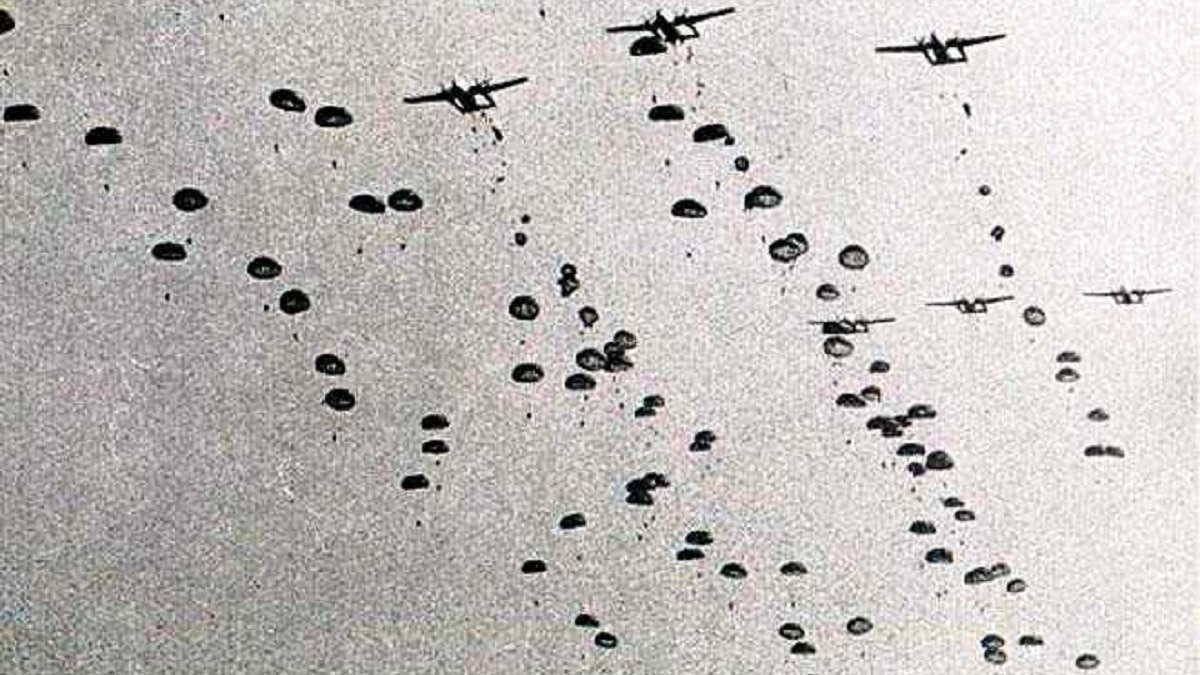Background of the Tangail Airdrop:
The Tangail airdrop was a critical operation during the 1971 Indo-Pak War, aimed at facilitating the liberation of Bangladesh. By December 1971, the Indian Army had launched a multi-pronged offensive against East Pakistan (now Bangladesh). The objective was to encircle and isolate Dhaka, the capital, and force the surrender of the Pakistani Army.
- Objective of the Airdrop: The Indian Army needed to cut off the retreat and reinforcement routes of the Pakistani 93rd Brigade, which was positioned north of Dhaka. Tangail, with its Poongli Bridge over the Jamuna River, was a vital crossing point for Pakistani forces.
- The Plan: The operation involved dropping paratroopers of the 2nd Battalion (Parachute Regiment) deep inside enemy territory near Tangail. Their mission was to secure the Poongli Bridge, preventing Pakistani forces from using it to retreat or counter Indian advances toward Dhaka.
Importance of the Tangail Airdrop:
- Strategic Advantage:
- The operation blocked a crucial escape route for the Pakistani forces, effectively isolating Dhaka and ensuring a swift Indian advance.
- It paved the way for a combined thrust of the Indian Army’s ground and air forces toward Dhaka, forcing Pakistan into a defensive posture.
- Accelerating Victory:
- The capture of Tangail and its surrounding areas hastened the collapse of Pakistani defenses, leading to the surrender of over 93,000 troops within days.
- Demonstration of Military Excellence:
- The successful execution of such a complex airborne operation showcased the Indian Army’s capability for precision planning, coordination, and execution in modern warfare.
- Psychological Impact:
- The airdrop demoralized the Pakistani military, creating panic among their ranks and eroding their ability to resist.
- It inspired confidence among the Mukti Bahini (Bangladeshi freedom fighters), who were fighting alongside Indian forces.
Difficulties and Challenges of the Operation:
- Hostile Territory:
- The operation was carried out deep inside enemy-controlled areas, where the Pakistani Army and local collaborators could potentially retaliate.
- Nighttime Navigation:
- The airdrop required precise coordination and navigation, often under the cover of darkness, with limited technological aids like GPS.
- Anti-Aircraft Threats:
- Indian transport aircraft carrying paratroopers had to navigate through hostile airspace, risking anti-aircraft fire from Pakistani forces.
- Reliance on Speed and Coordination:
- Success hinged on swift execution, as delays could have exposed the paratroopers to counterattacks before reinforcements arrived.
- Maintaining Secrecy:
- Ensuring the element of surprise was critical. Any intelligence leaks could have compromised the mission, leading to heavy casualties.
- Rapid Adaptation:
- Once on the ground, paratroopers faced the challenge of securing the bridge, organizing defenses, and holding their position until ground forces linked up with them.
Outcome of the Airdrop:
The Tangail airdrop was a resounding success. Paratroopers secured the Poongli Bridge and surrounding areas with minimal losses. This operation, combined with the Indian Army’s rapid advance, forced Pakistan to surrender on December 16, 1971, leading to the creation of Bangladesh.
It remains a landmark in airborne military history, highlighting the courage, skill, and strategic acumen of the Indian Armed Forces.


[…] Operation Tangail – On 11 December 1971, 2nd Battalion, Parachute Regiment (2 Para) carried out one of the biggest airborne assault near Tangail, Bangladesh, aiding the liberation of Bangladesh by cutting off Pakistani forces’ retreat, hastening Dhaka’s fall, and ensuring victory. […]